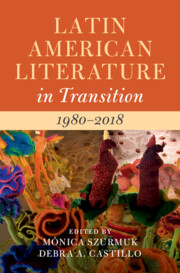Book contents
- Latin American Literature in Transition 1980–2018
- Latin American Literature in Transition
- Latin American Literature in Transition 1980–2018
- Copyright page
- Contents
- Contributors
- Acknowledgments
- Introduction
- Part I Security
- Part II New Genres
- Part III Mobilities
- Part IV Positionalities
- Part V Latin American Literature in Global Markets
- Chapter 22 Latin American Literature and Criticism in the Global Market
- Chapter 23 Memes in Brazilian Digital Culture
- Chapter 24 Mexican Transnational Cinema in the Twenty-First Century
- Index
- References
Chapter 24 - Mexican Transnational Cinema in the Twenty-First Century
from Part V - Latin American Literature in Global Markets
Published online by Cambridge University Press: 24 November 2022
- Latin American Literature in Transition 1980–2018
- Latin American Literature in Transition
- Latin American Literature in Transition 1980–2018
- Copyright page
- Contents
- Contributors
- Acknowledgments
- Introduction
- Part I Security
- Part II New Genres
- Part III Mobilities
- Part IV Positionalities
- Part V Latin American Literature in Global Markets
- Chapter 22 Latin American Literature and Criticism in the Global Market
- Chapter 23 Memes in Brazilian Digital Culture
- Chapter 24 Mexican Transnational Cinema in the Twenty-First Century
- Index
- References
Summary
Is it possible to continue talking about a national cinema at a time when production crews and financing are integrated internationally? How to deal with dichotomies of the national/international, domestic/foreign, interior /exterior, local /global, and other very close notions like identity, citizenship, and migration? In this chapter, I propose a discussion on the impact that artists generate in their environments when they expand global imagery, and how this happens thanks to the differences and diversity they make visible. I focus on two contemporary cases linked to Mexican cinema and one more that dialogues with the first. These are Roma (Cuaron, 2018) and the Guillermo del Toro exhibition En casa con mis monstruos (At Home with Monsters, 2017, 2019), as well as Coco (Unkrich and Molina, 2017). I invite overcome the idea of the nation as a delimited space. But also I argue how the transnational perspective does not entirely explain certain phenomena of territorialization and cultural deterritorialization. The notion of “multiple identities” will be useful for my arguments.
- Type
- Chapter
- Information
- Latin American Literature in Transition 1980–2018 , pp. 372 - 386Publisher: Cambridge University PressPrint publication year: 2022



